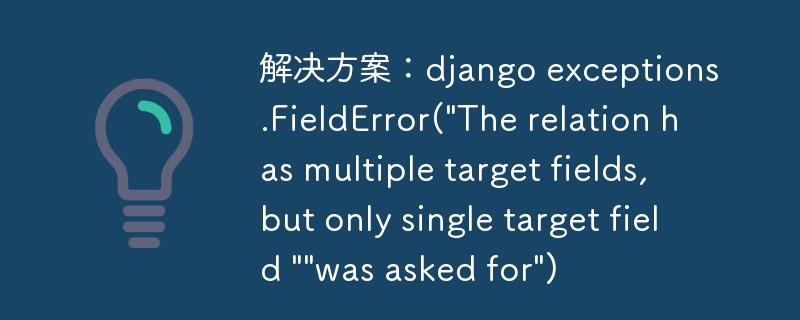

FieldError("The relation has multiple target fields, but only single target field was asked for") this The error usually occurs when you try to access a field of a related object that actually has multiple target fields.
For example, suppose you have a model `Author` and a model `Book`, and there is a many-to-many relationship between them. This error occurs if you try to access the `book` field of an `Author` object, but the associated object is actually associated with multiple `Book` objects.
To solve this problem, you need to change your code to use a way to access multiple target fields. For example, you can use `Author.book_set.all()` to get all `Book` objects of an `Author` object.
Hope the above information can help you solve the problem.
To solve the FieldError("The relation has multiple target fields, but only single target field was asked for") error, you need to change your code to use a way to access multiple target fields. Specifically, you can use one of the following methods:
- Use the `related_name` attribute to specify a custom name to access the related object. For example, you can specify `related_name='books'` when defining a many-to-many relationship, and then use `Author.books.all()` to get all `Book` objects of an `Author` object.
- Use Django's `related_objects` queryset to access related objects. For example, you can use `Author.related_objects.all()` to get all related objects of an `Author` object.
- Use DjanGo's `through` parameter to create an intermediate model and use this intermediate model to access the related object. For example, assuming you have defined an intermediate model `BookAuthor`, then you can use `Author.bookauthor_set.all()` to get all `BookAuthor` objects of an `Author` object, and then access each `BookAuthor` object `book` field to get the corresponding `Book` object.
You may need to debug your code to find out what went wrong. Here are some steps that may help:
- Make sure your associated fields are correct. For example, if you define a many-to-many relationship, you should use the `ManyToManyField` field to represent the relationship, rather than `ForeignKey` or `OneToOneField`.
- Make sure your associated objects are set up correctly. For example, if you have a many-to-many relationship, you should define a `ManyToManyField` field between each model and specify the other as the `related_name` parameter.
- If you use an intermediate model to represent your association, make sure you have defined the intermediate model correctly and specified the correct `through` parameter.
- If you use a custom name to access related objects, make sure you have specified the `related_name` parameter correctly.
- Try using Django's debugging tools to see if your queryset is correct. For example, you can use the `.query` property to see the generated sql statement, or `print(list(qs))` to see the objects contained in the query set.
Hope the above information can help you.
Here is an example, assuming you have a `Book` model and an `Author` model, and you want to define a many-to-many relationship that allows multiple books to be There are multiple authors, and each author can write multiple books:
class Author(models.Model): name = models.CharField(max_length=100) class Book(models.Model): title = models.CharField(max_length=100) authors = models.ManyToManyField(Author, related_name='books')
Now you can access the associated object via:
# 获取书的所有作者 book.authors.all() # 获取作者写的所有书 author.books.all()
If you encounter problems when defining related fields, such as using the wrong field type (for example, using `ForeignKey` instead of `ManyToManyField`), then you may receive something like "The relation has multiple target fields" error message. In this case, you should check your code to make sure you are using the correct field type.
If you have problems accessing the associated object, such as using the wrong name (e.g. trying to use `book.authors` instead of `book.authors.all()` to get the list of authors), then You may receive an error message similar to "This method must be implemented by a subclass". In this case, you should check your code to make sure you are using the correct method to access the association. Sorry, but I don't know what you are trying to ask. You can continue to ask your questions and I will try to answer you.
The above is the detailed content of 解决方案:django exceptions.FieldError(\'The relation has multiple target fields, but only single target field \'\'was asked for\'). For more information, please follow other related articles on the PHP Chinese website!
 The difference between Fahrenheit and Celsius
The difference between Fahrenheit and Celsius
 The role of float() function in python
The role of float() function in python
 Configure Java runtime environment
Configure Java runtime environment
 What to do if the documents folder pops up when the computer is turned on
What to do if the documents folder pops up when the computer is turned on
 The role of registering a cloud server
The role of registering a cloud server
 How to buy Ripple in China
How to buy Ripple in China
 NTSD command usage
NTSD command usage
 phpstudy database cannot start solution
phpstudy database cannot start solution
 Usage of background-image
Usage of background-image




